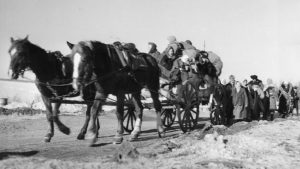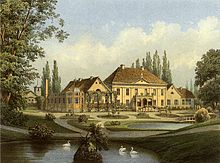
In January 1945, East Prussian Countess Marion Dönhoff jumped on her horse and headed west, away from the Russian army. Seven weeks later she and the horse arrived safely in Hamburg, where she settled and built a long career in journalism. She recounted the journey in her book Namen, die keiner mehr nennt. Ostpreußen – Menschen und Geschichte (1962).
One memorable incident was her encounter with Sibylle von Bismarck-Schönhausen, which I have translated here:
We had been traveling about 14 days when we arrived one evening in Varzin, a large estate in the Rummelsburg district, which Chancellor Bismarck had acquired with his endowment after 1866: large, magnificent woods, and a farm run in exemplary fashion.
The Nogat and the Weichsel lay behind us and I had thought this would be a place where we could rest a while. To finally arrive – what a relief it would be. We rode through the park gate and up the sloping path to the manor house. Up there, in front of the main gate, stood a wagon and two large rubber-tired carts, piled high with boxes. Others have already stopped by, I thought: hopefully there’s still room inside. But to my great surprise I learned that it was not the luggage of East-Prussian refugees; it was the Bismarck archive awaiting evacuation. Even here the decamping was underway. And I had believed that things were calm beyond the Weichsel.
At that time the Chancellor’s daughter-in-law was still alive – a small, slender, highly amusing and very old lady, who in her youth had been the cause of many a furrowed brow: she had hunted on horseback, smoked cigars and distinguished herself through joking and witty repartee.
And indeed she remained immensely compelling, so compelling that I could not decide – although it seemed imperative – whether to leave the next day. In the end we stayed two days. Two memorable days. Outside the refugees trekked slowly through the country, and as the last ones passed by, locals joined the train and became refugees themselves. Here, too, they had reached the turning point. The wagon we had seen had already driven away without the old Countess, who could not be convinced to leave Varzin. All our warnings and remonstrances were no use. She was quite sure she would not survive the Russian invasion. Nor did she wish to survive it, and she had had a grave dug in the park accordingly (on the assumption that nobody would have time to do so later on).
She wanted to stay in Varzin and enjoy her home to the last. And this she did with grandezza. Around her everything was as it always had been. The old servant, who did not wish to leave either, served at table. One superb red wine followed another – vintages that were the stuff of a connoisseur’s dreams. Not one word was spoken about what was happening outside or what was to come. She told lively, nuanced stories of the old days, her father-in-law, the imperial court, and the time her husband Bill Bismarck had spent as governor of East Prussia.
When I finally said farewell and we rode away, I paused halfway to the garden gate to look back once more. She was standing, lost in thought, in the doorway and giving a last wave with a little handkerchief. I think she was even smiling…though I couldn’t quite tell.

Thank you for translating this, I would love to read the entire book in English!
gosiababice@interia.pl
Wszystko co jest związane z ucieczką Hrabiny Donhoff na koniu jest fascynujące. Tłumaczę wszystko na polski.
W rzeczy samej! Dziękujemy za komentarz. (h/t Google Translate)
What a wonderful translation. Thank you. HOW I would love for you to translate the entire book so more people could enjoy these important reminiscences.
Thank you!